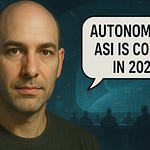Why I'm More Convinced Than Ever About Longevity Escape Velocity by 2030
Friends, many of you have been asking if I still believe we'll reach longevity escape velocity (LEV) by 2030, especially with all the recent AI breakthroughs dominating the headlines. My answer? Not only do I still believe it – I'm more convinced than ever.
Let me share why this isn't wishful thinking but a rational conclusion based on converging evidence. We don't need to achieve immortality right away – we just need to add more than one year of lifespan per calendar year to buy time for even better solutions.
The animal models already prove this is possible. We've extended the lifespans of mice (complex mammals!) by 30-50% using various therapies. The telomerase gene therapy alone extended mouse lifespan by 24% – equivalent to adding 30 human years. Imagine going from a max lifespan of 120 to 150 from a single treatment!
Even more impressive, partial reprogramming using Yamanaka factors doubled the remaining lifespan of older mice. Applied to humans, this could dramatically extend our lives even starting in middle age. I'm 39 now – if something similar worked for me, it could potentially push my life expectancy well beyond 120 years.
But here's where it gets really exciting: AI and quantum computing. These technologies are completely transforming how we approach longevity research. The computational barriers that previously made it impossible to simulate complete biological systems, metabolomes, or proteomes are rapidly falling.
AI is accelerating drug discovery, deepening our genetic understanding, and enabling personalized medicine approaches that were purely science fiction just years ago. Tools like AlphaFold, AlphaProteo, and Deep Research aren't just making research 20% faster – they're making it 2,000% faster!
World-leading experts are now saying that these technologies will likely cure essentially all diseases within the next 10-15 years. Cancer, heart disease, Alzheimer's – they're all computational problems at their core, and our computational power is exploding.
What does this mean for you personally? In the immediate term, you can already improve your healthspan with existing compounds (I've started NAD+ precursors myself and noticed improvements). Within a few years, simple but effective anti-aging compounds like rapamycin (used carefully) will become more accessible.
Looking further ahead, I expect we'll see comprehensive rejuvenation therapies becoming commonplace as we approach 2045. Imagine a sequence of treatments – perhaps once every 5-10 years – that dials your biological age back by 10-20 years. And each time you "kick the can down the road," the technology will have advanced even further.
The biggest obstacle isn't scientific or technical – it's human. Regulatory systems like the FDA haven't even classified aging as a disease yet (though they happily medicalize other natural processes like pregnancy). There's also a strange cultural acceptance of death that resembles a death wish when you really examine it.
I'd love to hear your thoughts on this topic in our community. Are you optimistic about LEV by 2030? What aspects of longevity research excite you most? And what steps are you taking today to extend your own healthspan while we wait for these breakthrough technologies?










